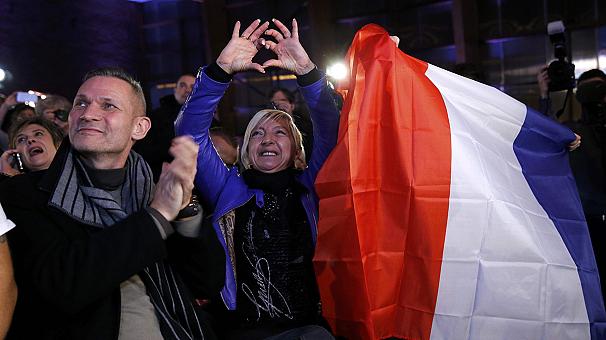The FN won 30.6% of the vote, with the conservatives trailing on 27%, and the governing Socialists down to 22.7%.
Le Pen got 43% in the Nord-Pas de Calais region and her niece, Marion Marechal Le Pen 41% in the south-east. These two regions could fall to the FN in the December 13 second round. The FN is also in first place in four other regions, so top in six out of 13.
“This vote confirms what previous elections have predicted already but what official observers wouldn’t yet admit: the FN is now without a doubt the first party in France while it is, let’s not forget, barely present in parliament,” said Marine Le Pen, welcoming the exit polls.
Former president Nicolas Sarkozy had been hoping his conservatives would benefit the most from Socialist disarray faced with the successive Greek, migrant, and terrorist crises over the past 12 months.
“It’s a new sign of the deep yearning of the French to see things change in our country. We need to hear and understand the deep despair of the French,” he said.
ISIL’s attack on Paris three weeks ago changed the game. President Francois Hollande’s response boosted his standings from a record low, but not his party’s. Instead the fear factor drove many voters to support the FN, but some Socialists say Le Pen’s maths are off.
“I’ve also looked at complete consolidated results, showing the balance of force between the left, right and the extreme-right. So if we look at this balance, the unified left should represent more than 36% of vote which makes it the 1st party in France,” said Agriculture Minister Stéphane Le Foll.
Sarkozy has already ruled out local deals with the left to stop the FN from getting in. The Socialists meet on Monday to decide if they will follow suit, or give way to conservatives where they have the best chance of stopping the FN. However late on Sunday night prominent Socialists were saying they would give way to the conservatives in the top two FN targets to try and freeze them out.
You can get live updates, a blog and map in English here.
The regional elections are the least important in France’s political calendar, but the regions, which have only recently been reduced in number but increased in size and given extra powers, control large budgets and things like public transport, economic development, and high schools. The FN has only ever held power in less than a dozen French cities, and has never held sway over a large geographical area and population.
Marine Le Pen’s stated ambition is to use the regions to build up networks of local activists and gain experience for party members and administrators ahead of the big push, the 2017 Presidential elections, which she wants to win.
More about:
















































